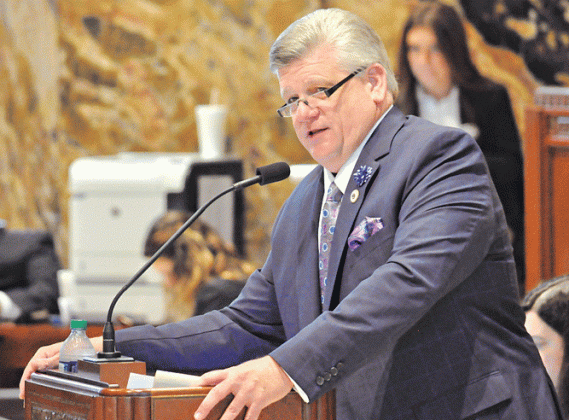
Katie Gagliano and Sarah Gamard /LSU Manship School News Service
As the window for calling a special session tightens, Gov. John Bel Edwards and House Republican leaders are still fencing over the details of his doomsday budget proposal and whether the Republicans will come up with an alternative plan next week.
Neither side has offered definitive numbers on its ideas to close the state’s nearly $1 billion budget gap, and both have criticized the other for not bringing enough detail to the table.
“In my opinion, the governor’s plan needs some work,” Republican Caucus Chairman Rep. Lance Harris, R-Alexandria, said in an interview Friday. “We have to have details of exactly who you’re going to tax, how you’re going to tax, before we can even begin to make an intelligent decision on behalf of our constituents.”
While Edwards’ proposal is a loose collection of tax-based solutions, the Republicans have yet to offer concrete recommendations of their own. Before calling a special session for February, Edwards has said, he wants to see that a compromise that would raise revenue and help stave off most of the cuts seems possible.
Harris said his delegation wants more information on how recent federal tax changes will affect the state’s budget, how potential improvement in the oil industry could improve revenue projections and what other spending cuts are possible.
Harris said Republican leaders are working on the budget with legislative staff, but whether that results in an agreement with the governor in time to call a special session is still up in the air.
Harris was mum on specifics about what the House Republicans are willing to support, citing continuing efforts to poll the membership.
Republican legislators floated several suggestions during a budget hearing on Monday. They included reducing tax exemptions for businesses and mandating work requirements and co-pays for Medicaid recipients. But none of the proposals received explicit support.
Harris said many legislators are still digesting the details of the governor’s presentation as a slew of lawmakers have migrated to the nation’s capital for the annual Washington, D.C., Mardi Gras, where the governor’s budget is a hot topic of debate and gossip at this year’s festivities.
Harris’ sentiments showed little change from what Republicans said earlier in the week. Rep. Cameron Henry, R-Metairie, said Monday he does not believe that the governor’s revenue-raising plan matches the expected shortfall because it is based on conjecture, not hard analysis. Henry said his members are dissatisfied with the proposal’s alleged lack of detail, and they want an “actual bill that has an actual fiscal note attached to it that’s accurate.”
Fiscal notes are reports created by the Legislative Fiscal Office that would analyze in more detail how — or whether — each of the governor’s proposals would generate the projected revenue.
Prior to the budget release, the Edwards administration floated a two-page action plan highlighting tax changes that could produce the necessary revenue to avoid the upcoming $1 billion fiscal cliff. The suggestions, pulled mostly from legislative task force recommendations released a year ago, called for making permanent reductions to tax credits, removing exemptions on the state sales tax, expanding sales taxes to services and taxing utilities.
Harris pointedly questioned Department of Revenue Secretary Kimberly Robinson on Monday about the validity of Edwards’ budget, asserting that the revenue-generating proposals still fell well short of the $994 million Edwards purported to be aiming for.
The governor “just repeats over and over again about his study committee,” Rep. Henry said, referring to the Task Force on Structural Changes in Budget and Tax Policy. “But in the same breath, he’ll say, ‘Well, those bills aren’t exactly right ... but it’s close.’ We’re not trying to get close. We’re looking for very specific information that is relatively elementary in the legislative process. It’s a bill and a fiscal note. We do them all the time.”
Sen. Sharon Hewitt, R-Slidell, said analysis on the plan’s effect on all stakeholders, including the average resident, is needed to know the ramifications of any legislative decision.
Hewitt said the governor and his aides “have done a great disservice to the process by not looking beyond the walls of the Capitol to look for best practices in other places in terms of expenses.”
“What we got was sort of a ridiculous budget,” she said, adding: “It’s not as cut and dry as they made it seem.”
